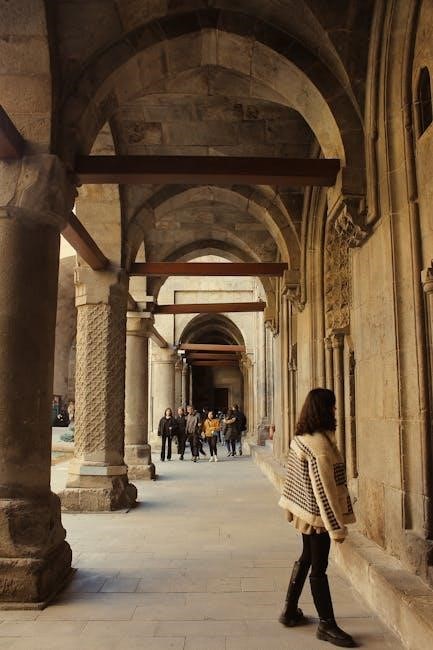The Catholic Voters Guide 2024 is a vital resource for faithful Catholics‚ providing clarity on key issues and candidates through the lens of Church teachings. By aligning votes with moral principles‚ Catholics can shape a just society‚ upholding the sanctity of life‚ social justice‚ and religious freedom. This guide empowers voters to make informed decisions rooted in faith‚ ensuring their choices reflect Catholic values in the 2024 elections.
The Importance of Faith in Voting
Faith plays a central role in shaping moral decisions‚ including voting. Catholics are called to form their consciences through Church teachings‚ ensuring choices align with divine truth. Voting becomes an act of worship‚ where decisions reflect love for God and neighbor. By prioritizing issues like life‚ justice‚ and freedom‚ Catholics fulfill their duty to contribute to the common good‚ guided by their faith.
Purpose of the Guide
The purpose of the Catholic Voters Guide 2024 is to assist Catholics in making informed decisions at the polls by aligning their votes with Church teachings. It provides clarity on key issues‚ evaluates candidates‚ and offers moral guidance‚ ensuring voters act as faithful disciples in shaping a society that reflects Catholic values and promotes the common good. This resource empowers Catholics to vote with a well-formed conscience.
Key Issues for Catholic Voters in 2024
The guide highlights critical issues like the sanctity of life‚ social justice‚ and religious freedom‚ helping Catholics align their votes with moral teachings and values.
- Sanctity of life
- Social justice
- Religious freedom
The Sanctity of Life
The sanctity of life is a cornerstone of Catholic teaching‚ emphasizing the inherent dignity of every human being from conception to natural death. Catholic voters are called to uphold this principle by supporting policies and candidates that protect the unborn‚ oppose euthanasia‚ and advocate for a culture of life. This issue remains central in guiding moral voting decisions.
- Opposing abortion
- Rejecting euthanasia
- Supporting pro-life candidates
Social Justice and Care for the Poor
Catholic teaching emphasizes the moral obligation to care for the poor and vulnerable‚ upholding the dignity of all individuals. Voters are encouraged to support policies and candidates that address poverty‚ inequality‚ and access to essential resources like healthcare and education. This commitment reflects the Church’s call to build a just and compassionate society.
- Supporting anti-poverty initiatives
- Advocating for equitable resources
- Promoting human dignity
Religious Freedom
Religious freedom is a cornerstone of Catholic values‚ ensuring the ability to live and practice faith without restriction. Voters must support candidates and policies that protect this fundamental right‚ safeguarding conscience protections and opposing discrimination. Upholding religious liberty aligns with the Church’s teachings on human dignity and the pursuit of truth.
Political Parties and Their Platforms
The 2024 election highlights key differences between Democratic and Republican platforms‚ each aligning with or contradicting Catholic teachings on life‚ justice‚ and freedom. Evaluating these platforms is crucial for informed voting decisions.
Democratic Party Platform
The Democratic Party platform emphasizes social justice‚ healthcare access‚ and environmental stewardship‚ aligning with some Catholic teachings on caring for the poor and vulnerable. However‚ differences arise on issues like abortion and religious freedom‚ where the platform’s stance may conflict with Catholic moral principles‚ prompting voters to carefully evaluate these contradictions in light of their faith.
Republican Party Platform
The Republican Party platform highlights pro-life policies‚ religious freedom‚ and traditional values‚ resonating with many Catholic voters. It opposes abortion and supports conscience protections‚ aligning with Catholic teachings on life and family. However‚ differences may exist on issues like immigration and social welfare policies‚ prompting Catholics to prayerfully evaluate candidates’ alignment with Church doctrine and moral priorities in the 2024 election.

Forming a Well-Informed Catholic Conscience
Forming a well-informed Catholic conscience involves understanding Church teachings‚ prayerfully evaluating candidates‚ and aligning votes with moral principles‚ ensuring decisions reflect Catholic values and faith-based priorities.
Understanding Church Teachings
Understanding Church teachings is foundational for Catholic voters‚ as they guide decisions on issues like life‚ dignity‚ and justice. Key principles include the sanctity of life‚ care for the poor‚ and religious freedom. Forming a well-informed conscience requires studying Catholic social doctrine and applying its moral framework to evaluate candidates and policies‚ ensuring votes align with faith-based values and ethical standards.
Evaluating Candidates
Evaluating candidates involves assessing their alignment with Catholic teachings on life‚ dignity‚ and justice. Voters should consider candidates’ positions on key moral issues‚ their policy proposals‚ and voting records. Comparing these to Church doctrine helps form a conscience guided by faith. Prayer and discernment are essential in making decisions that reflect Catholic values and ethical standards in the 2024 elections.
Notable Races and Their Implications
The 2024 elections feature pivotal races at both state and national levels‚ with significant implications for policies impacting life‚ family‚ and social justice‚ shaping the future of Catholic values in governance.
Presidential Election
The 2024 presidential race is a critical moment for Catholic voters‚ offering a choice between candidates with differing stances on life‚ religious freedom‚ and social justice. Catholics are urged to evaluate each candidate’s platform through the lens of Church teachings‚ ensuring their vote aligns with moral principles and promotes the common good.
Congressional and State Elections
Congressional and state elections in 2024 present opportunities for Catholics to influence policies at all governance levels. Voters are encouraged to assess candidates’ positions on issues like abortion‚ immigration‚ and social welfare‚ ensuring alignment with Catholic teachings. These races shape local and national agendas‚ making informed‚ faith-guided decisions crucial for fostering a just and compassionate society.

Addressing Conflicts Between Faith and Politics
Catholics often face moral dilemmas when faith and politics collide. Resolving these conflicts requires prayer‚ discernment‚ and adherence to Church teachings to guide voting decisions.
Navigating Moral Dilemmas
Catholic voters often face moral dilemmas when political issues conflict with their faith. To navigate these challenges‚ they turn to prayer and Church teachings for guidance. Evaluating candidates on key issues like abortion and social policies is crucial. By prioritizing non-negotiable moral principles‚ Catholics can make informed decisions that align with their conscience and faith‚ ensuring ethical leadership.
Role of the Church
The Catholic Church plays a vital role in guiding voters by providing moral and ethical frameworks. It emphasizes the importance of prayer‚ education‚ and conscience formation. The Church advocates for issues like life‚ family‚ and social justice but does not endorse specific candidates. Its role is to empower Catholics to vote in alignment with their faith‚ ensuring moral values shape societal decisions.

FAQs for Catholic Voters
Does the Church endorse candidates? No‚ it guides on moral issues like life‚ justice‚ and freedom. Catholics are urged to form consciences aligned with faith values.
Common Questions
Does the Church tell Catholics whom to vote for? No‚ it guides on moral issues like life‚ justice‚ and freedom. Catholics must form consciences aligned with faith values.
What issues should Catholics prioritize? Key concerns include abortion‚ social justice‚ and religious freedom. Voters are urged to evaluate candidates based on these moral principles.
Can Catholics vote for non-Catholic candidates? Yes‚ as long as their choices align with Catholic moral teachings and promote the common good.
Church’s Role in Elections
The Catholic Church guides voters by emphasizing moral principles but does not endorse specific candidates. It provides resources like voter guides and educational materials to help Catholics align their votes with faith teachings. The Church advocates for issues like life‚ justice‚ and freedom‚ empowering Catholics to make informed decisions that reflect their beliefs and values in the 2024 elections.
The Role of the Catholic Church in the 2024 Election
The Catholic Church plays a pivotal role in the 2024 election by providing spiritual guidance‚ educational resources‚ and advocating for moral values‚ helping Catholics make informed decisions.
Providing Guidance
The Catholic Church offers vital guidance to voters through educational resources‚ such as the National Catholic Register‚ which highlights moral issues and faithfulness in political decisions. By emphasizing the formation of a well-informed conscience‚ the Church equips Catholics to evaluate candidates and policies aligned with Catholic teachings‚ ensuring their votes reflect moral values and societal responsibility.
Advocating for Moral Issues
The Catholic Church strongly advocates for moral issues‚ emphasizing the sanctity of life‚ family values‚ and social justice. By addressing key concerns like abortion‚ immigration‚ and poverty‚ the Church guides voters to prioritize ethical decisions. Resources such as the Vatican’s teachings and the National Catholic Register highlight these moral imperatives‚ empowering Catholics to align their votes with faith principles in the 2024 elections.
The 2024 election is pivotal. This guide empowers Catholics to vote with informed consciences‚ upholding faith values. By choosing leaders who align with moral teachings‚ Catholics can shape a just society‚ promoting life‚ dignity‚ and compassion‚ ensuring their voices contribute to a morally grounded future.
Encouraging Participation
Catholics are called to actively engage in the electoral process‚ shaping a society rooted in justice and morality. Voting is a sacred duty‚ allowing faithful citizens to influence policies that align with Church teachings. By participating‚ Catholics can be a beacon of light‚ ensuring their voices advocate for life‚ dignity‚ and compassion. Let us pray‚ reflect‚ and vote with informed consciences‚ fulfilling our role in shaping a better future.
Impact of Informed Voting
Informed voting by Catholics can transform communities and nations by promoting leaders who uphold moral values. By aligning votes with faith‚ Catholics ensure policies respect life‚ dignity‚ and justice. This collective effort fosters a society where the vulnerable are protected‚ and the common good is prioritized‚ reflecting the teachings of the Church.

Additional Resources for Catholic Voters
The National Catholic Register‚ VoteWA.gov‚ and “Vote Catholic” websites offer essential guides‚ FAQs‚ and prayer resources to help Catholics make informed‚ faith-driven voting decisions.
Recommended Websites and Guides
Explore resources like Vote Catholic‚ National Catholic Register‚ and VoteWA.gov for comprehensive voter guides‚ FAQs‚ and prayer materials. These websites offer insights into candidates‚ key issues‚ and Church teachings‚ helping Catholics make informed decisions aligned with their faith. Utilize these tools to deepen your understanding and engage meaningfully in the 2024 elections with a well-formed conscience.
- Vote Catholic: Provides voter guides and faith-based resources.
- National Catholic Register: Offers candidate evaluations and moral guidance.
- VoteWA.gov: Includes election information and prayer reflections.
Prayer and Reflection
Prayer and reflection are essential for Catholic voters to discern their choices. Seek guidance through prayers like the Our Father and Hail Mary‚ and reflect on Church teachings. Engage in Eucharistic Adoration and rosary novenas for wisdom. Use resources like Voter’s Prayer and lectionary reflections to align your decisions with faith principles‚ ensuring your vote honors God and promotes the common good.
- Pray for discernment to make choices aligned with Catholic values.
- Reflect on Scripture and Church teachings to guide your decisions.
- Engage in prayer services for the integrity of the election process.














































